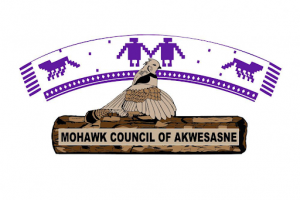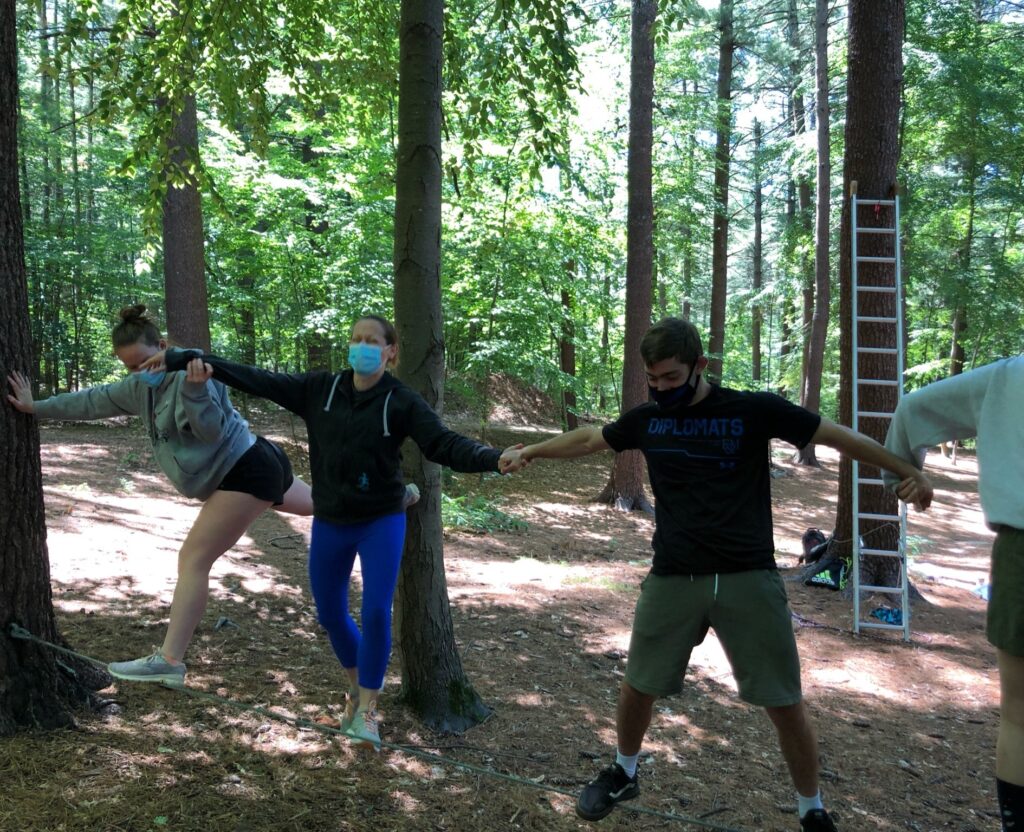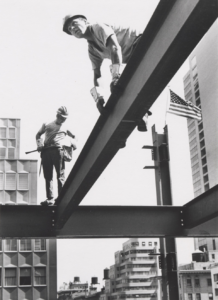A Walk Through History with the Mohawk Ironworkers By Jim Grout

Change is good, especially when you start to acknowledge past wrongs and take action to right them. One change that High 5 is putting some muscle behind is actively and deliberately addressing racism and racial inequity as it relates to our organization, our field of adventure education, and the community and world we all share as citizens. An alarm sounded when we reviewed some of our literature and products, and the question of cultural appropriation in the use of the term Mohawk Walk (a low challenge course element) arose. This wake-up call led us to deep reflection on the potential harm caused by this term. Is this an example of cultural appropriation? What do Native Americans think of this term? What should we do about it?
The purpose of this blog is to provide some history as it relates to the choosing of the Mohawk Walk name and to describe our process for arriving at the decision we have made for change. It’s a story about history, discovery, and addressing cultural appropriation for all of us, including the Mohawks of Akwesasne, whose leaders were consulted and approved this blog.

The Story of the Mohawk Walk
As one who has been in the adventure education field for almost 50 years, I am fortunate to have been personally involved with much of its development and evolution. Part of that good fortune involved co-leading many workshops with Karl Rohnke at Project Adventure (PA) and High 5.
How it All Began with Members from the Mohawks of Akwesasne
Around 1981, Karl and I were conducting a 5-day Adventure Programming workshop for PA. Several of the participants were members of the Mohawks of Akwesasne in Quebec, outside Montreal. In the AP workshop, we reserved the fifth and last day as a time to allow workshop participants to create and then build a low challenge course element. The thinking at the time was that it might generate some new ideas and would allow a “hands-on” building experience for participants. Realize that back in those days, people were often the facilitator and quasi builder for their school, camp, etc. Overall, the idea to build something on the last workshop day was only marginally successful because while people had good energy, they at times lacked ideas and/or building skills. It was a rare occasion when an idea actually worked; however, such was the case with the idea that these participants had on that day some 40 years ago.
A Rich History of Balancing at Height Continues
As they described to us at the time, the Mohawk people have a long history as Ironworkers involved with the construction of high-rise buildings throughout North America. This history, combined with the group’s challenge course idea, led to the creation of a low challenge course initiative that would involve participants inching along a series of cables 18” off the ground strung between a number of trees that could involve both short and long traverses. Their idea worked extremely well. It was completed and then used by our workshop group. It met all the requirements of a good low challenge course initiative in that it was challenging, extremely interactive, and built community. It was decided that very day to name it the Mohawk Walk in honor of their creativity and expertise. Needless to say, they were thrilled. It was such a winning idea that it quickly became part of all the challenge courses that PA and High 5 built and, over time, challenge courses built everywhere. For many of those years, it was referred to as the Mohawk Walk. For those of us who knew the history of its naming, it was simply a nice continuation of honoring its inventors. Of course like so many traditions, it was handed down verbally and those doing so were small in number so the story had limited reach.

What’s in a Name?
In recent years, as people have become more knowledgeable about the issue of cultural appropriation, we became aware of the possible need for the Mohawk Walk name to be changed. We wondered if our sharing of the history could keep up with the very real and legitimate growing concern and awareness that people were and are feeling about cultural appropriation. At one point during a staff meeting, I reluctantly suggested that perhaps it made the most sense to simply change the name in our High 5 literature, given the challenges of making the naming history known. Our staff pushed back, feeling that doing this would be dishonoring the Mohawk creators. As always, out of challenge come solutions, and in this case, that was in the form of a phone call I made to Chief Tim Thompson of the Mohawk Council of Akwesasne, in Quebec. I shared the story with him and asked for his guidance. He put me in touch with their tribal historian, Philip White-Cree. I explained the situation to Philip as well, assuring him that we would abide by his decision whether to keep or change the name.
Without hesitation, he recommended we keep the name in order to continue honoring those individuals who created it but suggested we change it to the Mohawk Ironworkers Walk. This would more fully capture the rich history of the Mohawk people and their role in the building of skyscrapers in cities everywhere.

We fully embrace this recommendation and thus the name change will take place this summer on our High 5 website and in future written publications. It will be accompanied by a brief explanation of the history of how the name came about. We encourage others in our field to follow our lead in this way.
Steps to Take to Halt Cultural Appropriation
As High 5 continues to move with greater intention toward better addressing racism and racial inequity, it is our intention to always:
- Be thoughtful and thorough in our approach
- Invite and seek out members of impacted communities to dialogue about topics
- Make the appropriate changes when deemed necessary
It may take us longer to reach a resolution, but in the end, we are confident we will make the right decisions and be stronger supporters and allies for all those who have carried so much injustice for far too long.
Thank you to Chief Tim Thompson and Historian Philip White-Cree for your input in helping us to broaden our understanding of the Mohawks of Akwesasne’s history and to continue to honor it with the Mohawk Ironworkers Walk challenge course initiative.
Additional Links:
Mohawk Council of Akwesasne: Website
Mohawk Ironworkers Documentary series
Example of Low Element Mohawk Ironworkers Walk
Additional Work Ahead
Change is continuous at High 5. We are examining another potential case of cultural appropriation in our use of the word Ubuntu on products we sell. More work to follow in the future that includes honoring the Nguni Bantu people who originated the word and how we feel it applies to our work in developing a community mindset.
HIGH 5 ADVENTURE LEARNING CENTER
130 Austine Drive, Suite 170
Brattleboro, VT 05301
Office: 802-254-8718
Toll Free: 877-356-4445
Fax: 802-251-7203
Privacy Policy
